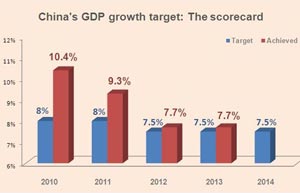Looking to a promising future
Updated: 2014-03-15 08:03
By Xu Hongcai (China Daily)
|
|||||||||||
China's total debt includes the government debt, household debt and enterprises' debt, which add up to 220 percent of its GDP. The government debt is about 30 trillion yuan ($4.89 trillion), or 60 percent of GDP; the household debt, 16 trillion yuan (or 31 percent of GDP); and the enterprise debt, about 60 trillion yuan (or 120 percent of GDP). But compared with other countries, China's debt level is low. Also, the Chinese economy has its advantages, including high savings and rapid economic growth rates, a low financial deficit level, trade surplus, large foreign exchange reserves and a low inflation rate, which strengthen its debt paying ability.
A further break-up shows local government debt is about 20 trillion yuan, which is moderate compared with other countries. Capital raised by the local governments' financing vehicles are mainly invested in infrastructure, which is essential to support their economies. Although such an investment has low return in the short term, it is good for economic development in the long run. And innovative policies and financial measures, like issuing long-term municipal bonds or extending their repayment periods, can be applied to resolve the local governments' short-term liquidity issue.
The second potential risk, the property bubble, can be overcome with some effort. Housing prices are high in first-tier cities such as Beijing and Shanghai mainly because of shortage of land supply. So once land supply is increased, the cost of land and thus property will drop, deflating the real estate bubble without causing much harm to the economy. And the property markets in third- and fourth-tier cities need to be dealt with according to the nature of their problems.
Shadow banking, despite posing a risk, can be transformed, through corrective and innovative measures, to act as the "supplement" of China's financial system. Financial regulators are already using limiting and guiding measures to strengthen supervision over the 20-trillion-yuan shadow banking, especially off-balance sheet activities and online financial transactions.
The tapering of QE poses a risk mainly because of the flight of capital from emerging economies to the US. But the flight of capital from China has not been on a large scale. The slight depreciation of the yuan is normal, so is the withdrawal of some money from the Chinese market. China's banking system and capital market are strong enough to resist external shocks and, more importantly, its huge foreign exchange reserves will ensure that it does not face a currency or financial crisis.
The author is a professor of finance at and director of the Information Department of China Center for International Economic Exchanges.
|
 |
 |
Related Stories
GDP target of 7.5% 'may be possible', expert says 2014-03-10 12:04
Good year-end 'to secure 7.5% growth target' 2014-03-10 08:14
China keeps 2014 growth target at 7.5% 2014-03-05 08:46
China's GDP growth in 2014 may drop to 7.5%: expert 2014-01-20 13:41
Today's Top News
Thai radar may have detected missing jet
Ukraine rejects Crimea treaty
Tourists to be refunded for smog
Chinese authorities upgrade food waste fight
First lady's visit to boost goodwill
Chinese authorities upgrade food waste fight
Xi to sign flurry of deals in Europe
Li vows not to give up plane hunt
Hot Topics
Lunar probe , China growth forecasts, Emission rules get tougher, China seen through 'colored lens', International board,
Editor's Picks

|

|

|

|

|

|





